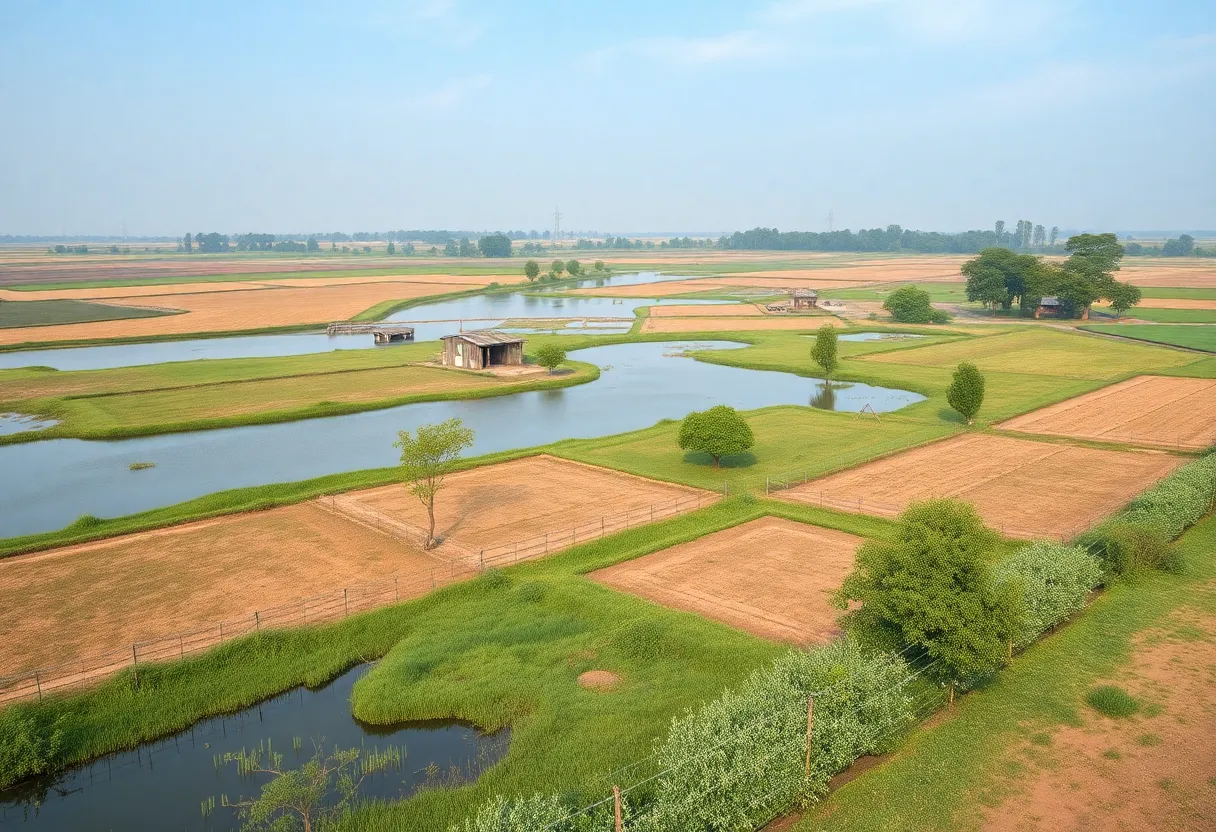Oklahoma City, October 21, 2025
Governor Kevin Stitt has intervened in a lawsuit regarding chicken waste pollution in rural Oklahoma, advocating for the poultry industry’s interests. Environmental groups allege that improper disposal of poultry waste harms local waterways, while the state’s $2 billion poultry sector supports numerous jobs in rural areas. Stitt’s move aims to prevent restrictions that could impose economic burdens on farmers amid growing environmental scrutiny. The case is closely watched as it may redefine agricultural regulations in Oklahoma.
Oklahoma City
Governor Kevin Stitt has officially filed to intervene in a prominent lawsuit addressing chicken waste pollution in rural Oklahoma, signaling strong state support for the poultry sector amid environmental concerns. The case involves farmers pitted against environmental groups, who allege that improper disposal of poultry waste is causing significant harm to local waterways. Stitt’s intervention aims to safeguard the state’s $2 billion poultry industry, which plays a crucial role in generating jobs and supporting rural economies. This development has drawn keen attention from legal experts, who anticipate it could influence future agricultural regulations across Oklahoma.
The lawsuit centers on claims that excessive poultry waste from large-scale farming operations is contaminating streams, rivers, and groundwater in rural areas. Environmental advocates argue that the runoff leads to nutrient overloads, promoting algal blooms and degrading water quality for communities and wildlife. In response, Stitt’s administration has emphasized the economic stakes, noting that the poultry industry employs thousands of Oklahomans and contributes substantially to the state’s agricultural output. By stepping in, the governor seeks to balance these environmental allegations with the need to protect a key economic pillar.
Details of the intervention filing reveal that the state intends to argue against the lawsuit’s potential to impose burdensome restrictions on farming practices. Officials from Stitt’s office have highlighted risks of job losses and reduced competitiveness for Oklahoma’s poultry producers if the case proceeds without state input. The move comes at a time when agricultural sectors nationwide face increasing scrutiny over sustainability, but Stitt’s action underscores a commitment to defending local industries against what the administration views as overly aggressive legal challenges.
Background of the Dispute
The origins of the lawsuit trace back to ongoing tensions between Oklahoma’s booming poultry production and environmental protection efforts. Over the past several years, rural communities have reported fish kills, foul odors, and diminished water usability linked to waste from chicken farms. Environmental groups filed the suit to enforce stricter waste management protocols, citing violations of state and federal water quality standards. Farmers, on the other hand, contend that current practices are necessary for efficient operations and that the allegations overlook the industry’s efforts to mitigate impacts through technologies like lagoons and land application of manure as fertilizer.
Oklahoma’s poultry industry has grown rapidly, becoming a cornerstone of the economy in regions like the eastern and southern parts of the state. With operations processing millions of birds annually, the sector generates revenue through meat production, exports, and feed supplies. However, this expansion has amplified waste production challenges, prompting debates over regulation. The lawsuit represents one of the most high-profile challenges to these operations, potentially setting precedents for how states handle similar conflicts between economic growth and environmental health.
Implications for Agriculture and Regulation
Legal observers suggest that Stitt’s intervention could reshape the trajectory of the case, possibly leading to negotiations or a broader review of poultry waste policies. If successful, the state’s involvement might prevent sweeping changes that could affect farm sizes, waste disposal methods, and compliance costs. Conversely, a ruling favoring the environmental groups could compel upgrades in infrastructure, such as improved treatment facilities, which might strain smaller operations while benefiting larger, better-resourced farms.
Beyond the immediate parties, the case holds statewide significance. Oklahoma’s agricultural community watches closely, as outcomes could influence policies on other livestock sectors, including cattle and swine. The poultry industry’s $2 billion valuation reflects its integration into supply chains that support processing plants, transportation, and retail across the state. Protecting these jobs—estimated in the tens of thousands—remains a priority for state leaders, even as calls for sustainable practices grow louder from advocacy groups and federal agencies.
In recent years, similar disputes have emerged in other agricultural states, highlighting a national conversation on balancing food production with ecological preservation. Oklahoma’s approach, through this intervention, positions it as a defender of agribusiness, potentially attracting support from industry stakeholders while facing criticism from conservationists. As the court proceedings unfold, stakeholders anticipate detailed assessments of waste management data, economic impact studies, and expert testimonies to clarify the extent of pollution and feasible solutions.
Economic Context of Oklahoma’s Poultry Sector
The poultry industry in Oklahoma is not just a local phenomenon; it ties into global markets, with exports contributing to economic stability. Major companies operate facilities that employ workers in processing, logistics, and support roles, fostering community development in rural areas where other job opportunities may be limited. Stitt’s filing emphasizes that disrupting this sector could have ripple effects, from reduced tax revenues to challenges in feeding national and international demand for poultry products.
Environmental concerns, however, persist, with data indicating elevated levels of phosphorus and nitrogen in affected waterways, which exacerbate issues like hypoxia in streams. Addressing these requires collaboration between regulators, farmers, and scientists to develop cost-effective strategies. The lawsuit’s progression may accelerate such efforts, prompting investments in innovative waste-to-energy projects or enhanced monitoring systems.
As Oklahoma navigates this legal battle, the focus remains on achieving a resolution that supports both environmental integrity and economic vitality. The coming months will likely see intensified debates, expert analyses, and possible legislative responses to refine regulations without undermining the state’s agricultural heritage.
Frequently Asked Questions
What is the main issue in the chicken waste pollution lawsuit in Oklahoma?
The lawsuit involves farmers pitted against environmental groups, who allege that improper disposal of poultry waste is causing significant harm to local waterways.
Why did Governor Kevin Stitt intervene in the lawsuit?
Stitt’s office claims the suit could devastate the $2 billion poultry industry, vital to state jobs.
What is the economic significance of the poultry industry in Oklahoma?
The $2 billion poultry industry plays a crucial role in generating jobs and supporting rural economies.
How might the lawsuit affect agricultural regulations?
Legal experts anticipate it could influence future agricultural regulations across Oklahoma.
Key Features of the Chicken Waste Pollution Lawsuit
| Feature | Description |
|---|---|
| Parties Involved | Farmers pitted against environmental groups |
| Main Allegation | Improper disposal of poultry waste harms waterways |
| Governor’s Role | Governor Kevin Stitt files to intervene |
| Economic Impact | Potential devastation to $2 billion poultry industry, vital to state jobs |
| Broader Implications | Influence on future agricultural regulations |





